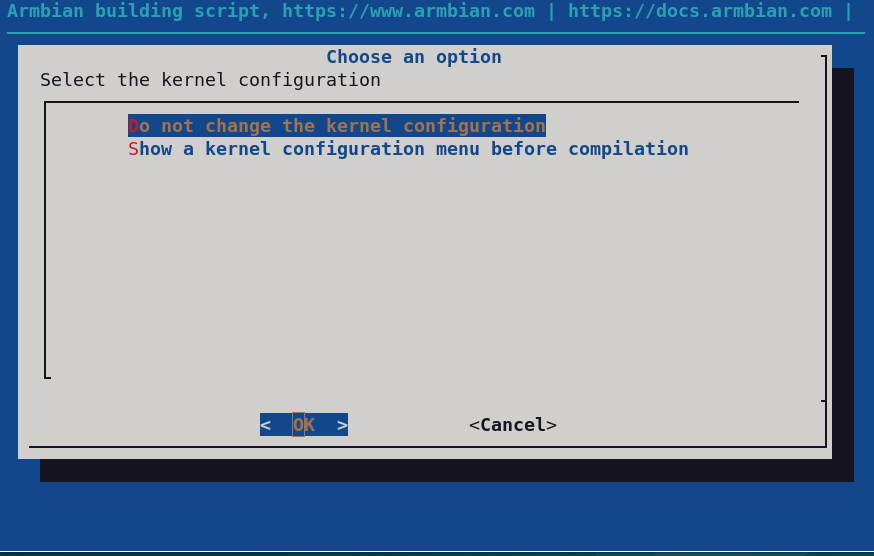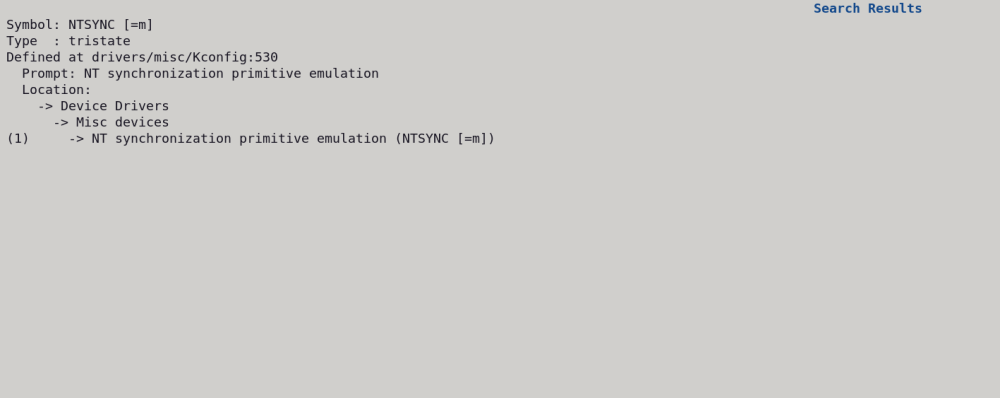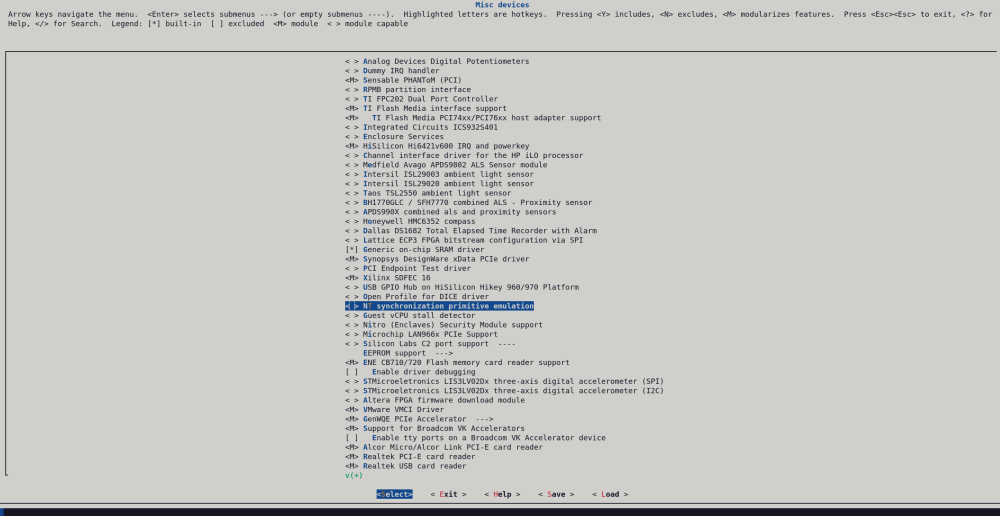All Activity
- Past hour
-
Recommended. It looks like its not that far away. With rebase you will see the diff and if this is all you need to apply.
- Today
-
Hello fellow Linux gurus, Seeking for some assistance on this. I have NIC1 on 192.168.100.1/24 network with gateway set as 192.168.100.254 < this cant be changed. with a few PC’s connected to this. And NIC2 on 10.10.10.1/24 with a few devices on this. I want to be able to ping from PC1 connected to NIC1 on 192.168.100.100/24 to devices connected to NIC2 on 10.10.10.100/24 Could someone advise on the route settings I need to configure to make this work please ?
-
I was able to find a UART module to read out the boot. See the file attached of the full log I was able to capture. It seems to fail on this part: Starting kernel ... done. Begin: Mounting root file system ... Begin: Running /scripts/local-top ... done. Begin: Running /scripts/local-premount ... Scanning for Btrfs filesystems done. Begin: Waiting for root file system ... Begin: Running /scripts/local-block ... done. Begin: Running /scripts/local-block ... done. Begin: Running /scripts/local-block ... done. Begin: Running /scripts/local-block ... done. Begin: Running /scripts/local-block ... done. Begin: Running /scripts/local-block ... done. Begin: Running /scripts/local-block ... done. Begin: Running /scripts/local-block ... done. Begin: Running /scripts/local-block ... done. Begin: Running /scripts/local-block ... done. Begin: Running /scripts/local-block ... done. Begin: Running /scripts/local-block ... done. Begin: Running /scripts/local-block ... done. Begin: Running /scripts/local-block ... done. Begin: Running /scripts/local-block ... done. Begin: Running /scripts/local-block ... done. Begin: Running /scripts/local-block ... done. Begin: Running /scripts/local-block ... done. Begin: Running /scripts/local-block ... done. Begin: Running /scripts/local-block ... done. Begin: Running /scripts/local-block ... done. Begin: Running /scripts/local-block ... done. Begin: Running /scripts/local-block ... done. Begin: Running /scripts/local-block ... done. Begin: Running /scripts/local-block ... done. Begin: Running /scripts/local-block ... done. Begin: Running /scripts/local-block ... done. Begin: Running /scripts/local-block ... done. done. Gave up waiting for root file system device. Common problems: - Boot args (cat /proc/cmdline) - Check rootdelay= (did the system wait long enough?) - Missing modules (cat /proc/modules; ls /dev) ALERT! UUID=0a0755af-1936-4167-9d26-9ca9a87a9103 does not exist. Dropping to a shell! U-Boot SPL 2025.10-rc3-armbian-2025.txt
-
For this board https://www.olimex.com/Products/SOM/NXP-iMX8/iMX8MP-SOM-4GB-IND/open-source-hardware It looks like Olimex have forked Armbian-build and done the board bringup: https://github.com/OLIMEX/imx8mp-build/commit/a3cb5ad2710cd3edf6a4c6c067b049af48b03fa5#diff-1b53368896f4902ddbb5db1fa206835ccbb04445cd8bcaa5fef353655794665a How could I bring that code back into the main https://github.com/armbian/build/tree/main I think I need to rebase the Olimex fork back to the main Armbian Repo? Or should I fork the Armbian repo and then re-apply the Olimex changes to the fork?
-

Efforts to develop firmware for H96 MAX M9 RK3576 TV Box 8G/128G
xiaobao80 replied to Hqnicolas's topic in Rockchip CPU Boxes
Modified based on nanopi-r76s.dts, both wireless and Bluetooth networks are working properly. There is no 3.5 interface fiber optic interface audio in DTS, and the standard infrared remote control cannot be used 4k hardware acceleration mpv kodi is normal Compile-configuration.zip -
Terrific! You're welcome!
-
@The Tall Man Thanks again, it works
-
@The Tall Man Thank you very much, I will try and fb!
-
@Rodrigo Campos@Nick A This guy seems to have created a u-boot that can get 4gb ram for M98-8K. https://github.com/nitrolack/M98-8K-Linux/blob/main/U-Boot Screen 20-03-2024
-
That module is not included in the default kernel build configuration. But you can build the kernel yourself. https://docs.armbian.com/Developer-Guide_Build-Preparation/ https://docs.armbian.com/Developer-Guide_Build-Commands/ When you run ./compile.sh, the first thing it shows you is the kernel configuration screen (image 1). Select, "Show a kernel configuration menu before compilation". When it finally arrives on the configuration menu (image 2), use the forward slash key (/) for search, enter ntsync. When the result comes up (image 3), press 1 to select it. It will take you right to it. It will be highlighted (image 4). Press the M key to select it as a module. The use the right arrow to move from Select to Exit, and keep doing that until you get to where you save it. Then keep going with the rest of the process. I could be wrong about this, but I think you can build the kernel only without the whole armbian image too, with this (from the second link above); ./compile.sh kernel-config BOARD=orangepi5 BRANCH=edge Image 1: Select Kernel Configuration Image 2: Kernel Configuration Menu Image 3: Search Result - NTSYNC Image 4: - NTSYNC Selection
-
As the title says, how can I install the ntsync kernel module for use with Wine/Proton?
-
For anyone interested in solving this temporarily, doing the following steps worked for me: sudo systemctl edit systemd-networkd ### Editing /etc/systemd/system/systemd-networkd.service.d/override.conf ### Anything between here and the comment below will become the new contents of the file [Service] ExecStartPre=/bin/sleep 5 ### Lines below this comment will be discarded sudo systemctl daemon-reexec sudo reboot
-

Rupa X88 Pro 13 - RK3528 board with images
John Taylor replied to fedes_gl's topic in Rockchip CPU Boxes
Guys, please do keep us all updated on the rk3528. I was just about to buy a job lot of boards for a grid computing project when I found it's not supported yet. I found that my old TV rk32xx box was well supported, so am prepared to wait. -
As other people have noted, there are issues trying to connect the CB1 to wifi after the first boot. I believe I've narrowed down the cause, but I'm not sure about the right way to fix it permanently. The issue I was experiencing is as follows: 1. Flash latest armbian minimal to sd card 2. Plug into CB1 and turn it on 3. Go through first boot setup and connect to wifi normally 4. Reboot CB1 5. CB1 no longer connects to wifi, wpa_cli says 'CTRL_EVENT_SCAN_FAILED' A temporary solution I found is to mask systemd-networkd, then manually unmask systemd-networkd and start it after booting. This suggests that the problem is that systemd-networkd tries to talk to the RTL8189 before it's ready, and that puts the chip into a bad state. The wireless connection works on the first boot, because the CB1 doesn't try to configure the chip until after it has booted up. If I only mask netplan-wpa-wlan0 (instead of masking networkd) and try to manually bring it up, then I get an empty scan result, rather than CTRL_EVENT_SCAN_FAILED. Is there a way to make systemd-networkd wait until after the driver has loaded before trying to configure the chip? The easiest temporary solution is probably to just add a delay before systemd-networkd starts.
-
@snow try the transpeed image https://github.com/NickAlilovic/build/releases/tag/20250306
- Yesterday
-
Thanks for the reply. In the end I soved it by following also a few steps from over here. I don't know exactly what did the trick, but actually I assume it was pure coincidence: my ethernet device is actually called en0, not eth0. During my first run through this tutorial I wasn't aware of that. I think I simply forgot to change this bit in my recent try and luckily got it working that way. About the systemd-cryptsetup: I don't know if I understand correctly, but doesn't this do some of the steps automatically which we set up manually? If so, maybe it should be adopted to this tutorial in the future …
-
You could try to write the bootloader again to the SD-card, it seems like it's mixed up. Old with new. not sure if the names are exactly like this but something like this: cd /usr/lib/linux-u-boot-vendor-orangepi-5 sudo dd if=u-boot-rockchip.bin of=/dev/sdx seek=64 conv=fsync sudo sync Or is ls -l /boot to see if the symlinks are correct. The correct dtb in armbianEnv.txt? The correct dtb for your current kernel version?
-
Any direction on where to look/fix?
-
There are three ways to do this. The first simplest is to assemble a binary debian package using the Armbiyan assembly system and then convert it to a rpm package directly in a running OpenSuse OS. The second way is more complicated but it is more correct. You can take patches directly from the build system and apply them to OpenSuse kernel sources in the sequence in which the build system does this while running. Next, build the kernel package using rpmbuild. The third way is the same as the second but use OBS. This will allow you to have your own repository of signed packages and install them using zypper. You can find like-minded people anywhere on our planet, including this place. Hope this helps you.
-

HC4 PWM Fan Control Not Working - Need Guidance to Contribute a Fix
Georges Holland replied to Adrienne's topic in Beginners
Hey, I think I'm impacted by the same issue. I've replaced the original fan of the HC4 with a Noctua NF-A4x10 5V PWM earlier this year. It was working as expected, but since couple weeks the fan is at 100% speed continuously, which is loud. It sounds like it's a software upgrade that broke the PWM control, but no idea which one. I've done part of the same testing you mentioned but didn't managed to find a fix neither. I'm probably even more beginner than you, so I don't think I can help much unfortunately. How can we get more eyes on this issue? Did you post on Odroid Forum? -
OK, so I installed the latest Debian/Trixie + Cinnamon + vendor kernel available and audio is working. The name of the cards and mixers are different though: speaker-test worked both by specifying the mixer (... -D plughw:CARD=rockchiphdmi0,DEV=0) or through PulseAudio's ALSA emulation after setting the default sink to the rockchiphdmi0 card. The list of audio cards is different in the vendor kernel than what's available OOB with the edge kernel, so I'm not sure if the configuration is comparable. But the audio port/cable combo seems to be fine so there's that..
-
Yes, exactly.
-

Motorcomm YT6801 Ethernet Controller
Xorcist replied to Xorcist's topic in UEFI x86 / qemu x86 / arm64
Oh are you saying that the Tuxedo v1.0.30 package works with the latest 6.12.44 headers? I did not try moving ahead to the latest as I didn't see an option to swap to that kernel in armbian-config (only to go back to 6.12.32). My current kernel is 6.12.41 (default install). I assume I can manually update via: sudo apt-get update && apt upgrade -y and then install the headers afterwards.









